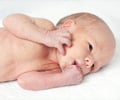In a news study it has been shown that babies who were given an aid to help them breathe do not have the much feared consequences and is safe. The way was CNEP therapy - continuous negative-extrathoracic pressure.
The theory was researched and assessed by unconnected Nottingham researchers to the original trial in the early 1990s.This method was pioneered by controversial Stoke-based paediatrician Professor David Southall.
The Nottingham researchers followed up 133 of the 205 children still alive - now aged between nine and 15 - who were involved in the original CNEP study.
Half had the CNEP treatment - where pressure is applied to a child's chest to aid breathing. The rest were given the standard treatment of a breathing tube being inserted through the larynx - part of the windpipe.
No evidence was seen of a higher risk of long-term disabilities for children given CNEP.
“Our long-term study of the original trial participants suggests no evidence of disadvantage, in terms of long-term disability or psychological outcomes, from the use of CNEP," said the lead authors Professor Neil Marlow, of Queen's Medical Centre.
Advertisement
In their words, "We fear that over the last six years many infants with bronchiolitis a potentially fatal chest infection] presenting to our children's unit have received unnecessarily intensive care."
Advertisement







